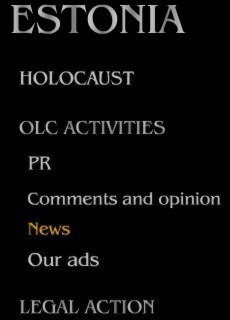TALLINN (AFP/EJP)--- Russia snubbed Monday an invitation to attend Estonian ceremonies
to mark the end of World War II, including one at a Soviet
war memorial at the centre of a bitter dispute between the
neighbours.
Embassy spokesman Maxim Kozlov said Russian diplomats would not attend a Tuesday’s
events -- including one at the controversial Bronze Soldier
statue -- because for Russians victory in the war was the
following day.
"We will not attend the
laying of flowers at the military cemetery on May 8, because
for Russia, Victory Day is on May 9," he said.
The removal of the statue has been criticised by Jewish groups
both in and outside Estonia.
Last week the Israel director of the
Simon Wiesenthal Centre Dr. Efraim Zuroff, said the Center
belives the removal of the monument "minimizes the severity of the crimes of the Holocaust in Estonia and insults
all the Nazis’ victims in the country".
Estonia received an "F" or
failing grade in the Wiesenthal Center’s last (2007) Annual
Status Report on the worldwide investigation and prosecution
of Nazi war criminals, published this month.
"While the Center fully
empathizes with the suffering of Estonians of all faiths
and nationalities under Soviet rule it must never be forgotten
that it was the Red Army which effectively stopped the mass
murder conducted by the Nazis and their local collaborators
on Estonian soil until the final day of its occupation by
Nazi Germany," Zuroff said.
"Thus the removal of the
monument from the center of Tallinn by the government reflects
a regrettable lack of sensitivity to the depth of Nazi criminality
and is an insult to its victims. This is not surprising in
a country which has proven to be indifferent to the crimes
committed by Estonian Nazi collaborators, not a single one
of whom has been held accountable since Estonia became independent,
whereas numerous Communist collaborators have been prosecuted
by the local judicial authorities."
Revisionist history
Mark Grubarg, member of the board
of the European Council of Jewish Communities and chairman
of the Jewish Community of St Petersburg, echoed Zuroff’s
remarks.
"Even though the Estonian
authorities’ intention to unveil the monument to the Liberator
Soldier in the military cemetery is a step to reconciliation,
the removal of the monument and the excavation of the graves
in the run up to May 9 is a symbolic gesture in favour of
the revision of history," Grubarg said.
He pointed out that "Estonia’s
population largely denied support to the authorities’ actions,
as the immorality of what takes place is obvious to everyone
with clear reason."
"It is highly important
that leaders of Jewish communities in Europe should declare
that such actions are impermissible," Grubarg said.
Kozlov said the Russian ambassador would instead lay wreaths
on Wednesday at a military cemetery in Tallinn and at other
Soviet war graves and monuments around the country.
Estonia regretted that the Russians
were not attending the events which it said would gather
diplomats from 27 different countries.
"While it is the right
of the Russian embassy to choose which ceremonies to attend,
we are sorry Russia will not join the international community
in Tuesday’s ceremonies," defence ministry spokesman Madis Mikko told AFP.
Worsening relations
Russia’s apparent snub came 10 days
after the Estonian authorities moved the Bronze Soldier from
its pride of place at a busy crossroads to a military cemetery
in a quiet neighbourhood of the capital.
The removal of the statue, which Russia
sees as a sacred memorial to Red Army soldiers who died fighting
Nazism, sparked rioting in Tallinn and saw relations with
Moscow sink to their lowest point since Estonia won independence
from the Soviet Union in 1991.
Moscow dismisses Estonia’s view that
the statue also symbolizes two occupations of Estonia by
Soviet forces, one in the early stages of World War II, the
other after, which led to half a century of rule from Moscow
and the deportation to Siberia of tens of thousands of Estonians.
Mikko, the Estonian defence ministry
spokesman, made a point of saying that Estonia was not commemorating
only those who were victorious in World War II but also the
victims of the war.
"Estonia considers itself
a victim of the war. We were attacked by both sides," he said.
Russia and many members of the large
Russian community in Estonia mark the end of World War II
on May 9.
Half the population of Tallinn and
around 30 percent of Estonia’s population of 1.34 million
are ethnic Russians.
For Estonia and the other two Baltic
states, Latvia and Lithuania, May 9 marks the start of nearly
50 years of Soviet occupation which began at the end of World
War II and ended in 1991, when the Soviet Union crumbled.
Besides the event at the Bronze Soldier,
Estonia is holding other ceremonies at a memorial to Jews
killed in the Holocaust, and at a war monument in Tallinn
to Red Army soldiers and Estonians who fought on the side
of Germany.
ejpress.org
| 

